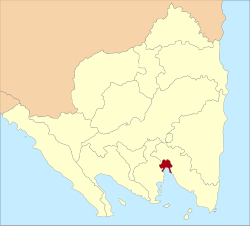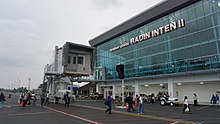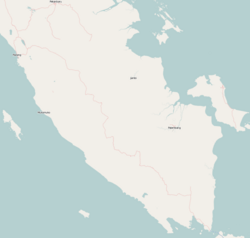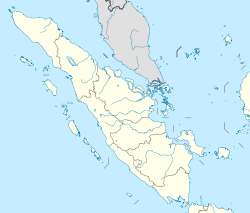Bandar Lampung
Bandar Lampung | |
|---|---|
| City of Bandar Lampung Kota Bandar Lampung | |
Adipura Monument Aerial view of Southern Bandar Lampung Tanjung Karang Station Grand Mercure Hotel Siger Monument | |
| Nickname: Kota Kain Tapis (lit. 'City of Tapis') | |
| Motto(s): Ragom Gawi (lit. 'Language and Culture') | |
 Location within Lampung | |
| Coordinates: 5°27′0″S 105°16′0″E / 5.45000°S 105.26667°E | |
| Country | |
| Region | Sumatra |
| Province | |
| Founded | 17 June 1682 |
| Government | |
| • Type | City |
| • Mayor | Eva Dwiana |
| • Vice Mayor | Deddy Amrullah |
| Area | |
| 183.77 km2 (70.95 sq mi) | |
| Elevation | 15 m (49 ft) |
| Population (mid-2023 estimate)[1] | |
| 1,100,109 | |
| • Density | 6,000/km2 (16,000/sq mi) |
| • Metro | 1,600,000 |
| Human Development Index | |
| • HDI (2007) | 0.742 |
| Time zone | UTC+7 (Indonesia Western Time) |
| Postcodes | 35111 to 35246[2] |
| Area code | (+62) 721 |
| Website | bandarlampungkota |
Bandar Lampung (Lampungese: Kutak Bandarlampung; formerly Dutch: Oosthaven, lit. 'Eastern Harbor') is the capital and largest city of the Indonesian province of Lampung. Located on the southern tip of Sumatra, Bandar Lampung was originally called Tanjungkarang–Telukbetung, since it was a unification of two major settlements in Lampung, before being renamed in 1983.[3]
The city proper, together with South Lampung Regency (which borders the city on its northern and eastern sides) and Pesawaran Regency (which borders it on its western side), are major transmigration recipients. The city's area is about 183.77 km2. It had a census population of 881,801 in 2010[4] and 1,166,066 in 2020;[5] the official estimate as of mid-2022 was 1,100,109 (comprising 556,781 males and 543,328 females).[1]
History
[edit]Bandar Lampung is the capital city of Lampung Province. Before it was named Bandar Lampung, this city was named Tanjung Karang–Teluk Betung. It was a combination of the two twin cities of Tanjung Karang and Teluk Betung; the two twin cities were previously part of South Lampung Regency. This naming is because the city of Bandar Lampung consisted of the city of Tanjung Karang and the city of Teluk Betung. In 1982, there was an expansion of the territory with the inclusion of three new districts[6][7]
Early history
[edit]A report by the Banten regent William Craft to Governor-General Cornelis Speelman states that, on the basis of a description provided by Pangeran Aria Dipati Ningrat on 17 June 1682, "Lampung-Telokbetong at the edge of the sea is the seat of power of a Dipati Temenggung Nata Negara, with power over three thousand people". This date would later be adopted by the city administration as its official founding date.[8]
Dutch East Indies
[edit]

Under the Dutch colonial administration, 1912 Staatsblad 462 codified the city as being part and parcel of the Onderafdeling Telokbetong, composed of present-day Teluk Betung and its environs. The Onderafdeling's capital was Tanjung Karang, while Teluk Betung itself served as the seat of government for the Karesidenan Lampung.[8]
Geography
[edit]Bandar Lampung, formerly Tanjungkarang-Telukbetung, the capital of Lampung Province, Indonesia, lies at the head of Lampung Bay on the south coast of the island of Sumatra. Bandar Lampung was created in the 1980s from the amalgamation of the former provincial capital, Tanjungkarang, with the port of Telukbetung. The city's cottage industries include metalworking, hand-weaving, and pottery and tile making. With air, road, and rail connections. Bandar Lampung is the chief port and transportation center for the surrounding agricultural area, which produces rubber, tea, coffee, and pepper for export.[9]
Under Japanese occupation
[edit]During the Japanese colonial era, present-day Bandar Lampung was administered as a city, led by a Japanese mayor, who was assisted by an Indonesian deputy mayor (副市長, fuku-shicho).[8]
Post-independence
[edit]After Indonesian independence in 1945, Tanjung Karang and Teluk Betung initially fell under the jurisdiction of South Lampung Regency, until a 1948 law consolidated the two and elevated them to independent city status.[8]
Administrative districts
[edit]
At the time of the 2010 census, the city of Bandar Lampung was divided into thirteen administrative districts (Indonesian: kecamatan), but subsequently seven additional districts were created by the splitting of existing districts, bringing the total to twenty districts. The new districts are Bumi Waras, Enggal, Kedamaian, Labuhan Ratu, Langkapura, Teluk Betung Timur (East Teluk Betung) and Way Halim.
The twenty districts are tabulated below with their areas and their populations at the 2010 census[4] and the 2020 census;[5] together with the official estimates as of mid 2023.[1] The table also includes the location of the district administrative centres, the number of administrative villages (all classed as urban kelurahan) in each district and its postal codes.
| Area code (kode wilayah) |
Name of district (kecamatan) |
Area in km2 |
Pop'n census 2010 |
Pop'n census 2020 |
Pop'n estim. mid 2023 |
Admin centre |
No. of kelu- rahan |
Postal codes |
|---|---|---|---|---|---|---|---|---|
| 18.71.08 | Teluk Betung Barat (West Teluk Betung) |
18.26 | 59,396 | 41,096 | 38,527 | Bakung | 5 | 35232 - 35239 |
| 18.71.19 | Teluk Betung Timur (East Teluk Betung) |
10.39 | (a) | 53,874 | 49,926 | Sukamaju | 6 | 35231 - 35237 |
| 18.71.07 | Teluk Betung Selatan (South Teluk Betung) |
3.49 | 92,156 | 42,870 | 39,359 | Gedong Pakuon | 6 | 35211 - 35229 |
| 18.71.20 | Bumi Waras | 4.52 | (a) | 63,166 | 58,169 | Sukaraja | 5 | 35224 - 35228 |
| 18.71.04 | Panjang | 13.64 | 63,504 | 80,811 | 74,858 | Karang Maritim | 8 | 35241 - 35246 |
| 18.71.05 | Tanjung Karang Timur (East Tanjung Karang) |
2.07 | 89,324 | 43,076 | 38,542 | Kota Baru | 8 | 35121 - 35126 |
| 18.71.18 | Kedamaian | 8.34 | (a) | 57,905 | 53,457 | Kedamaian | 8 | 35122 - 35133 |
| 18.71.09 | Teluk Betung Utara (North Teluk Betung) |
4.38 | 62,663 | 53,552 | 50,587 | Kupang Kota | 6 | 35211 - 35215 |
| 18.71.06 | Tanjung Karang Pusat (Central Tanjung Karang) |
3.50 | 72,385 | 55,925 | 50,326 | Palapa | 7 | 35111 - 35119 |
| 18.71.17 | Enggal | 2.78 | (a) | 28,649 | 25,752 | Enggal | 6 | 35111 - 35127 |
| 18.71.03 | Tanjung Karang Barat (West Tanjung Karang) |
11.54 | 63,747 | 65,554 | 63,194 | Gedong Air | 7 | 35151 - 35159 |
| 18.71.13 | Kemiling | 21.33 | 71,471 | 88,574 | 86,300 | Beringin Jaya | 9 | 35153 - 35158 |
| 18.71.16 | Langkapura | 5.30 | (a) | 43,569 | 43,372 | Langkapura | 5 | 35152 - 35157 |
| 18.71.01 | Kedaton | 3.77 | 88,314 | 57,336 | 52,388 | Kedaton | 7 | 35141 - 35148 |
| 18.71.10 | Rajabasa | 12.93 | 43,257 | 57,589 | 55,958 | Rajabasa Nunyai | 7 | 35144 - 35145 |
| 18.71.11 | Tanjung Senang | 9.24 | 41,225 | 62,168 | 62,402 | Tanjung Senang | 5 | 35141 - 35143 |
| 18.71.14 | Labuhan Ratu | 6.10 | (a) | 52,393 | 48,208 | Kampung Baru Raya | 6 | 35142 - 35149 |
| 18.71.02 | Sukarame | 10.92 | 70,761 | 67,725 | 67,138 | Sukarame | 6 | 35131 |
| 18.71.12 | Sukabumi | 25.04 | 63,598 | 75,870 | 73,178 | Sukabumi | 7 | 35122 - 35245 |
| 18.71.15 | Way Halim | 6.25 | (a) | 74,364 | 68,468 | Way Halim Permai | 6 | 35123 - 35141 |
| Total city | 183.77 | 881,801 | 1,166,066 | 1,100,109 | 126 |
Note: (a) the 2010 population of this new district is included in the figures for the district(s) from which it was separated.
Demographics
[edit]Bandar Lampung is the fourth-largest city in the region of Sumatra, after Medan, Palembang and Batam. The city's population of 790,057 in 2005; 881,801 in 2010,[4] 977,686 in 2015 and 1,166,066 in 2020;[5] the official estimate as of mid-2023 was 1,100,109, giving a drop of over 100,000 from the figure for the previous year.[1]
The dominant ethnic groups in Bandar Lampung are Javanese, primarily composed of the descendants of people transported from Java in the early 20th century by the Dutch and the transmigration program of the New Order regime. The Lampungese are natives of the city, having lived as peddlers and fishermen in the outskirts of the city. The other major ethnic groups are Sundanese and Bantenese who originate from across the strait. This city is the largest population of Sundanese and Bantenese outside of West Java who have lived since the Banten Sultanate era. Chinese and Minangkabau who each amount to around 3.3% of the city's population are mostly concentrated around the city center and near the markets.
Climate
[edit]Bandar Lampung has a tropical rainforest climate (Af) with heavy rainfall year-round. Rain gets noticeably heavier from November to April.
| Climate data for Bandar Lampung | |||||||||||||
|---|---|---|---|---|---|---|---|---|---|---|---|---|---|
| Month | Jan | Feb | Mar | Apr | May | Jun | Jul | Aug | Sep | Oct | Nov | Dec | Year |
| Mean daily maximum °C (°F) | 30.3 (86.5) |
31.0 (87.8) |
31.6 (88.9) |
32.0 (89.6) |
31.9 (89.4) |
31.7 (89.1) |
31.3 (88.3) |
31.4 (88.5) |
31.4 (88.5) |
32.0 (89.6) |
32.0 (89.6) |
31.1 (88.0) |
31.5 (88.7) |
| Daily mean °C (°F) | 26.4 (79.5) |
26.7 (80.1) |
27.2 (81.0) |
27.3 (81.1) |
27.2 (81.0) |
26.8 (80.2) |
26.6 (79.9) |
26.6 (79.9) |
26.7 (80.1) |
27.2 (81.0) |
27.3 (81.1) |
26.9 (80.4) |
26.9 (80.4) |
| Mean daily minimum °C (°F) | 22.6 (72.7) |
22.5 (72.5) |
22.8 (73.0) |
22.7 (72.9) |
22.5 (72.5) |
22.0 (71.6) |
21.9 (71.4) |
21.8 (71.2) |
22.1 (71.8) |
22.4 (72.3) |
22.7 (72.9) |
22.7 (72.9) |
22.4 (72.3) |
| Average precipitation mm (inches) | 280 (11.0) |
281 (11.1) |
255 (10.0) |
175 (6.9) |
135 (5.3) |
119 (4.7) |
100 (3.9) |
121 (4.8) |
118 (4.6) |
139 (5.5) |
149 (5.9) |
250 (9.8) |
2,122 (83.5) |
| Source: [11] | |||||||||||||
Transportation
[edit]Air
[edit]
Bandar Lampung is served by Radin Inten II Airport (TKG), in the neighbouring county of South Lampung. The airport can be accessed by public transportation, such as bus and mini bus.
Road transport
[edit]Bandar Lampung has several road transportation alternatives. The most popular is a minibus called angkot, an abbreviation from Angkutan Kota (literally translated as 'City Transportation'). They serve routes throughout the city, operated privately and cheaply. Usually, an angkot covers some area between Tanjung Karang (the heart of Bandar Lampung) and an urban area. Currently, routes covered are Tanjung Karang – Garuntang, Tanjung Karang – Teluk Betung, Tanjung Karang – Rajabasa, Tanjung Karang – Sukarame, Tanjung Karang – Langkapura and more.
Bandarlampung Transportation Office has announced that in October 2011 it will serve two of the seven routes planned by bus rapid transit—the Rajabasa-Sukaraja and Sukaraja-Korpri housing complexes in Sukarame.[12]
Rail transport
[edit]
Tanjung Karang Station in Bandar Lampung is the terminus of the railway service from Palembang, although the railway track continues all the way until Panjang harbor and Tarahan coal offloading point. There are many express trains connecting Bandar Lampung and Palembang, including the Limex Sriwijaya and Rajabasa Express.
Media
[edit]The oldest newspaper in the Lampung region is Lampung Post, part of Media Group. Several other newspapers, such as Tribun Lampung and Radar Lampung are also available.
The privately owned Radar Lampung TV and Tegar TV are the local TV stations based in Bandar Lampung. The public TVRI Lampung also covers the city.
Education
[edit]

In 2009, Bandar Lampung had a literacy rate of 94.3%,[13] slightly increased from 2005, which was 93.5%. However, the high school participation rate kept decreasing, from 69.2% (2007) to 61.4% (2009).[14] On the other hand, the high school participation rate in Indonesia rose from 54.6% in 2007 to 55.8% in 2010.[15]
There are some notable high schools and universities in Bandar Lampung, such as SMP Negeri 2 Bandar Lampung (public), SMP Negeri 1 Bandar Lampung (public), SMA Negeri 2 Bandar Lampung (public, known as Smanda), SMA Negeri 9 Bandar Lampung (public, known as Smalan), SMA Negeri 1 Bandar Lampung (public, known as Smansa), SMA Al-Kautsar Bandar Lampung (private), SMA Fransiskus Bandar Lampung (private), SMP Xaverius 4 (private Catholic junior high school), SMA Xaverius Pahoman (a Catholic private school teaching students from kindergarten to high school, locally known as Xavepa), Lampung University (public, locally known as Unila), Bandar Lampung University (private, locally known as UBL: Universitas Bandar Lampung), Muhammadiyah University of Lampung (known as UML: Universitas Muhammadiyah Lampung and Malahayati University (private). In March 2011, Unila already had 70,866 alumni.[16]
Sister cities
[edit]Bandar Lampung is twinned with:
 Liwa, Indonesia
Liwa, Indonesia Kuantan, Malaysia
Kuantan, Malaysia Ipoh, Malaysia
Ipoh, Malaysia Seberang Perai, Malaysia
Seberang Perai, Malaysia Split, Croatia
Split, Croatia
See also
[edit]References
[edit]- ^ a b c d Badan Pusat Statistik, Jakarta, 28 February 2024, Kota Bandar Lampung Dalam Angka 2024 (Katalog-BPS 1102001.1871)
- ^ "Kode POS Kota Bandar Lampung - urut Kecamatan/Distrik - hal 1". kodepos.nomor.net.
- ^ "Peraturan Pemerintah Nomor 24 Tahun 1983". President of Republic Indonesia. 1983. Retrieved 5 July 2011.
- ^ a b c Biro Pusat Statistik, Jakarta, 2011.
- ^ a b c Badan Pusat Statistik, Jakarta, 2021.
- ^ "Kota Bandar Lampung | BPK Perwakilan Provinsi LAMPUNG".
- ^ "Sejarah Kota Bandar Lampung, Dimulai dari Telukbetung dan Tanjungkarang". 15 August 2021.
- ^ a b c d "PORTAL Berita Resmi Pemerintahan Kota Bandar Lampung". bandarlampungkota.go.id. Retrieved 3 June 2020.
- ^ "Bandar Lampung | Indonesia | Britannica".
- ^ Sensus Penduduk 2010
- ^ "Lampung Town climate: Average Temperature, weather by month, Lampung Town weather averages - Climate-Data.org". en.climate-data.org.
- ^ "Bandarlampung to unveil BRT as passenger-friendly transport". 22 September 2011.
- ^ "Angka Melek Huruf Penduduk berumur 15 tahun ke atas menurut Kabupaten/Kota 2005-2009" (PDF). Badan Pusat Statistik Provinsi Lampung, Indonesia. 2010. Archived from the original (PDF) on 26 March 2012. Retrieved 3 July 2011.
- ^ "Angka Partisipasi Sekolah menurut Kabupaten/Kota" (PDF). Badan Pusat Statistik Provinsi Lampung, Indonesia. 2010. Archived from the original (PDF) on 26 March 2012. Retrieved 3 July 2011.
- ^ "Indikator Pendidikan Tahun 1994-2010". Badan Pusat Statistik. 2010. Archived from the original on 17 July 2011. Retrieved 3 July 2011.
- ^ "WISUDA: Unila Lahirkan 1.403 Sarjana". Lampung Post. 16 March 2011. Retrieved 3 July 2011.[permanent dead link]










